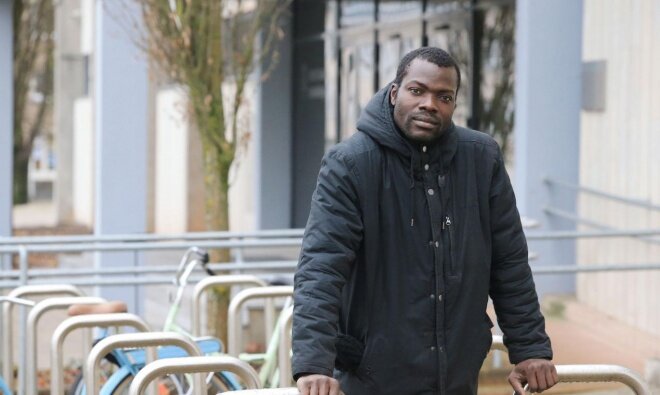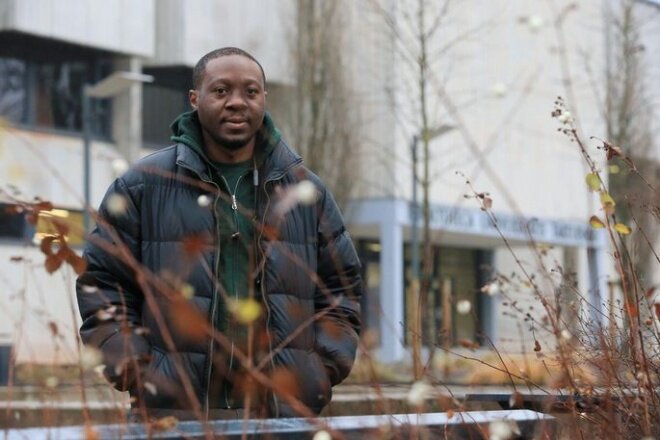African students in search of good education in Estonia

The application procedure to the University of Tartu is convenient and logical, say students from Nigeria and Congo.
Rasheed Ade from Nigeria, a master’s student in chemistry at the University of Tartu, first heard about Estonia in the spring of 2016. He was looking for online courses to study analytical chemistry, and happened to find the one taught at the University of Tartu. He liked the course, which also introduced the new master’s programme.
Ade is interested in working in the area of quality control in the future, and for that it is important to have in-depth knowledge of analytical chemistry. “In my home country, I would not have been able to study this subject in such depth,” he says. “If you have a goal and it is not taught in your home country, you need to move abroad.”
Ade’s father studied in the United Kingdom in his time. One of his brothers is currently a visiting professor at Missouri university and another is a PhD student in Malaysia.
Ade had already started applying to a university in Canada but he was upset by the confusing and constantly changing conditions there. That is why he decided to check out the University of Tartu. “I looked into the history of the university, the quality of education, and then applied,” he said. In less than three months, he received the positive answer.
“The University of Tartu gave me all the support I needed – visa and travel information, background information to help me, they even arranged the accommodation,” Ade praises the university. “They replied very quickly and were always ready to help; differently from the university in Canada.”
Finally, also the Canadian university admitted Ade. Their confirmation, however, came three weeks after the Nigerian had already come to Estonia.

Percé Ngoy of the Democratic Republic of the Congo first heard about Estonia in India. He had gone there after having almost reached the diploma in medicine in Congo but then deciding he would be more interested in becoming an engineer. Therefore, he went to New Delhi, to the local branch of a prestigious US university.
“When I arrived in India, I discovered that the education did not meet the level I expected. I studied there for two years and then decided it was not what I wanted,” Ngoy says.
When a classmate told Ngoy about Estonia where his sister was studying, the Congolese was sceptical at first. Nevertheless, he looked into the background of the University of Tartu and decided to apply. Similarly to Ade, he liked the straightforward and fast procedure of online application to Estonian universities.
Ngoy simultaneously also sent applications to other institutions and was also admitted to universities in Canada, Germany and Netherlands. The reason for choosing Estonia was prosaic: here the living costs were the lowest of the four.
Now it seems that Ngoy, 28, does not have to keep looking for an ideal university forever. He is currently in his third year of the robotics bachelor’s programme in Tartu, planning to graduate in spring and then also complete the master’s programme here. “This is the quality I had been looking for. Tartu offers challenges to me, it is one of the best universities in the world. I can get high-quality knowledge. I am proud that I made a good choice.”

Both Ade and Ngoy work in parallel with studies. They both have a job that is related to their specialisation. Ade works for a chemical company – he points out, however, that currently not in a position related to analytical chemistry. Ngoy is employed as a software developer by his alma mater.
It also turns out that they both regard communicating with the African community more important than interacting with their compatriots.
“There are quite a lot of us from Africa, but only two people from Congo in Tartu – me and another person who is working towards PhD in chemistry here,” says Ngoy.
Both Ade and Ngoy find that Estonians tend to be introverted. “But this is your culture. I respect cultural differences,” says Ade. He compares Estonia to his homeland where the population is more than 200 million and there are hundreds of languages, cultures and ethnic groups, and thinks that in this sense, the picture is much clearer in Estonia.
Originally from south-eastern Nigeria, Ade went to secondary school and university in the northern part of the country, and believes that finding one’s way in the multitude of different customs is a much bigger challenge. “For example, where I went to high school, direct eye contact is considered disrespectful. When asked something, it is polite to look down,” he says, as an example.
Ngoy says he has made many of his local friends through the church, just like he did earlier in India. “In the church you can find people of all backgrounds. They do not see you as someone coming from another country but as brothers and sisters,” says the Congolese Protestant who attends services at Tartu International Fellowship.
Ade, who is a Muslim, admits it is not so easy for him to practice his religion. “First, people don’t know much about my religion and what they know is negative. Some tell me, you cannot be a Muslim, you are too nice to be a Muslim,” he says.
According to Ade, the Muslim community in Estonia keeps in touch with each other. “When there is an attack in Belgium, for example, we get together and talk that this is not what Islam taught us,” he says. “Then also security services always contact us. They tell us to notify them when someone tries to radicalise us – or attack us. They try to protect us.”
Ade confirms, however, that he does not know any Muslims in Estonia who would have experienced inconveniences due to Islamic attacks in other countries.
When asked what they miss above all in Estonia, they both answer: their family. And explain that its meaning is much wider for them than what is understood by this word in Estonia. In addition to the mother, father and children, it also means ten or more relatives who are living under the same roof or visiting.
“You are never lonely there, but it’s very easy to feel lonely here. And, sometimes, the days are just too slow,” Ade admits.
The article has been abridged from Postimees. The abridged text has been translated by the University of Tartu.






